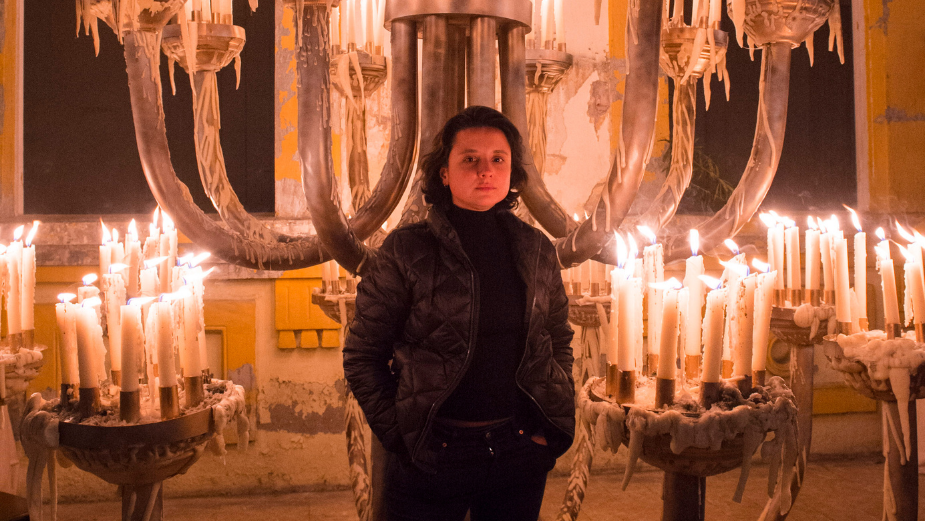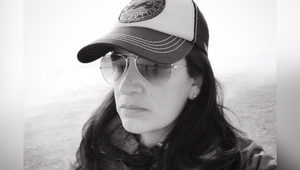
Carolina Costa: “Storytelling Is Like Shouting into a Tunnel, Hoping Someone Else Shouts Back”

Why does a filmmaker become a filmmaker? Every artist will invariably have their own shifting passions and motivations, but for Carolina Costa it was always clear: filmmaking is the best way to tell the stories that need telling.
The cinematographer's eye-catching career so far has elevated voices which bring new and different perspectives to the human experience. Whether it be through Minhal Baig and Jada Pinkett Smith’s coming-of-age story Hala, or exploring the darker places of the human psyche in Wander Darkly (starring Sienna Miller and Diego Luna), Carolina tells stories which reveal different sides to humanity - be they for better or worse.
Having recently signed for the branded production company Gloria Content, there’s no sign of Carolina slowing down. With her recent work including the final season of HBO’s critically acclaimed Insecure, it’s clear that this is a filmmaker whose star is on the rise.
To find out more about her creative process and approach to storytelling, as well as cast an eye forward to the future, LBB caught up with Carolina…
Q> I understand that, before you became a director, you studied journalism. So is it fair to say that you’ve always been a storyteller?
Carolina> Yes, absolutely I would say that. What eventually drew me to making movies and commercials was storytelling.
As a kid I used to write a lot, often just small stories that I would share with my family. Sometimes I would ask them to read characters, and things like that. So I have always had a passion for stories, and I spent a few years figuring out how best to express it. That did initially draw me to journalism, and I always had something of a romantic idea of what journalism could do in terms of changing the world. But now, I think I’ve discovered that there are other ways of telling stories that can have more impact.
Q> And do you find that it’s easier to tell stories that move people through film rather than journalism?
Carolina> Perhaps it’s different now with social media and having the ability to see everything that’s going on in the world - but when I was growing up there were basically two newspapers, each of them pretty one-sided with no room for introspection or nuance in your own opinion. The world was presented in a very black-and-white way.
Contrast that with filmmaking, and I think the things that you make in this industry truly reflect the world. Creativity is a constant mirror of society that reflects both who we are and how we understand who we are. I came to a point where I decided that journalism couldn’t do that in the pure way that creative storytelling and filmmaking can.
Q> So, for you, is the point of storytelling to affect some kind of change in your audiences?
Carolina> I think that’s always part of the goal, right? As a storyteller, the experience is often a bit like shouting into a deep tunnel and hoping that someone else is going to shout back. But, to continue that analogy, you’re hoping that it’s not just an echo of your own voice but something new, a different perspective that adds to the narrative you’re exploring.
After a while, hopefully more people will hear it and join the conversation. That’s the way I hope to try and affect change.
Q> You’ve spoken previously about the impact of Before The Rain, a Macedonian film telling the story of love in times of war. Why is this such an important film for you?
Carolina> ‘Before The Rain’ was the first time that I witnessed the power of storytelling. The fact it was set in the Balkans also lent it another, almost unearthly quality to me - a woman who had been growing up in Brazil and had no real concept of this place on the other side of the planet. So it was a story set in an unfamiliar place, during a conflict I didn’t truly understand, and yet the human emotion of it was completely relatable and I could easily put myself in the shoes of the characters.
At that point I was just 12 years old, so I’m sure I wasn’t intellectualising it and thinking ‘oh this is the power of storytelling’, but there’s no doubt it inspired me to tell more stories.
Above: 1994’s Before the Rain by Milcho Manchevski entwines three love stories against a backdrop of war and political turbulence in Macedonia.
Q> Wander Darkly also tells a story about love under extreme (and often surreal) circumstances. As a filmmaker, are you particularly attracted to exploring themes of conflict around love - or is that just a coincidence?!
Carolina> Haha, I think I’m attracted to conflict - the ‘love’ part is a coincidence! I like characters who aren’t perfect, just like the rest of us. I really buy into the theory that we’re all a reflection of our environment, and I’m especially interested in people who are trying to break out of that mould. So I enjoy telling stories about misfits, and there tends to be a lot of conflict that comes with that.
So with Wander Darkly we’re really exploring that internal conflict. Inside all of us there’s an interior universe that ultimately defines who we are, and so any conflict within that world has high stakes. That’s the kind of story I think I will always be interested in telling.
Above: 2020’s Wander Darkly premiered at the Sundance Film Festival, and tells the story of a couple experiencing strife sparked by past trauma.
Q> Congratulations on recently joining Gloria Content! Are there any particular kinds of projects which you’re especially excited to be working on?
Carolina> What’s special about working with Gloria and Eric [Bonniot, founder] is that they get to know you before they put you on any projects. They take the time to understand what each of us is passionate about and how they can help us excel. So one of the things I talked about with Eric that excites me a lot is storytelling in Mexico, looking for voices and places that we haven’t necessarily heard from before.
In that spirit, I’m incredibly excited to be working on a feature right now. It’s based in Mexico, in an ‘Army School’ where young boys are trained to fight. We’ve seen similar stories told from a US perspective, but not really one that we have heard from the perspective of Mexico.
Q> Is this another example of you being drawn to conflicts?!
Carolina> Haha, yes I suppose it is. At its heart, this story is one of the system eating a man and his subsequent search for redemption having been spat out. But as well as conflict, another theme in my work is that hope - or aspiration - for change. You often need some conflict in order to get there, but that’s the overriding goal.
Another example of that is Insecure, for which I was involved with filming the final season just recently. It’s a show that doesn’t shy away from the kind of internal conflicts I mentioned earlier, but it confronts them with bravery and ultimately in pursuit of positive outcomes. That’s the kind of story I love to tell.
Q> You’ve also said previously that you love telling stories that haven’t been told before. Your work with Burger King, Tamarindo, is a good example of that! Why do you think branded content like that is proving popular and effective at the moment?
Carolina> Going back to my point earlier about telling stories from new perspectives, I think this is a format which opens up space for new voices and narratives. And these are stories which people want to hear, so for a brand to be attached to that in a subtle way which doesn’t obstruct the storytelling is clearly a win-win situation.
But that’s not to say that this style of storytelling or marketing will be exclusively in this format in the future. I think there’s space for all kinds of ideas.
Q> Before moving to the US, I understand that you lived in London. As we’re a UK publication, I have to ask - what did you learn during your time in the UK, and have you picked up any particularly British habits?
Carolina> Haha, I think the most important thing that Britain taught me was timing. You guys are so punctual. One of the first things I got taught on a job in the UK was that ‘if you’re not early, you’re late’. And I’ve lived by that ever since!
That, and a cup of tea in the afternoon - plus an Earl Grey in the morning - is what has stuck with me from my time in Britain. A friend of mine was recently able to travel to the UK for work, and she asked me if I wanted her to bring anything back. I asked for as much Earl Grey as she could cram into her suitcase! If you’re working with me on-set, you’ll find me in the mornings sipping a cup of Earl Grey.
Q> What’s the best piece of advice you’ve received in your career so far?
Carolina> My earliest mentor told me something that I have only truly understood very recently, years after she unfortunately passed away. And that is simply to ‘enjoy everything’. You have to enjoy the steps of building your career, and spending time with the people you tell stories alongside. If not, it’s just painful! So making sure you enjoy that process of discovering and creating is essential to any storyteller, I think.
Q> Finally, the past 18 months have been challenging for so many of us. How have you been staying creatively inspired and motivated throughout it all?
Carolina> When it was impossible to be on-set last year, I started teaching masterclass sessions online. I did this for a few schools in Europe and Latin America, and I just found it to be the most inspiring thing. I was able to take everything I had learned and give it back, in some small way, to young storytellers all over the world and share in their ideas as well.
So during those bleak months where everything was shut down, that kept me inspired and hopeful.










